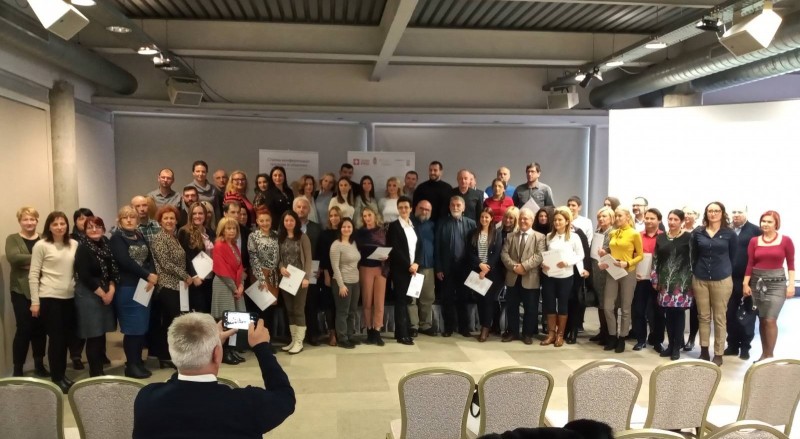News / Actualities
Certificates Delivered to the Participants of Second e-training on Good Governance
-
Belgrade, 20 December 2019
This is the second training on this topic, and it will be organized again in the coming years within the project "Improving good governance at the local level", which is implemented through the Swiss PRO Programme, supported by the Swiss Government in cooperation with the Government of Republic of Serbia, and implemented by the United Nations Office for Project Services (UNOPS) in partnership with the SCTM.
E-training lasted seven weeks and provided key information, knowledge and examples of practice relevant to the implementation of good governance principles in local self-governments in areas such as: responsible development and public resource management, predictability of administrative procedures, cost-effective and efficient exercise of local self-government competencies, protection of rights and participation of citizens in conducting public affairs at the local level, equality and prohibition of discrimination, transparency in the conduct of local self-government affairs and prevention and sanctioning of corruption at local level.
“What is the main objective of public administration reform is to enable a better life for citizens, as well as to improve the quality of services we provide to them. These services can be of high quality only if they are provided by professionals, so I thank you for your dedication and engagement in attending the training. In the process of reforming public administration, we have to take steps to professionalize and depoliticize the administration and to pay special attention to strengthening the professional and human resources in the local self-government units”, said Saša Mogić, Assistant Minister of Public Administration and Local Self-Government, adding that there were daily demands from the Government, line ministries and some new priorities and obligations, raised questions about which employees have the skills to respond to these challenges.
Mogić announced that the Ministry of Public Administration and Local Self-Government is beginning work on preparing a program of reform of the local self-government system in cooperation with the SCTM and again with the support of the Government of Switzerland. According to him, this program for the first time in Serbia should come up with a strategic document that deals only with the reform of the local self-government system. This document will cover everything that exists at the local level: administration, institutions, businesses, job organization, funding, election system, demographic trends, and more, said Mogić.
Đorđe Staničić, Secretary General of the SCTM thanked the Ministry of Public Administration and Local Self-Government for their cooperation, UNOPS as a partner, and the donor - the Government of Switzerland. He congratulated the training participants who, after seven weeks of intensive work on 13 lessons and the same number of exams - tests and assignments, together with their mentors successfully completed accredited e-training, and thus earned the right to a certificate. In his address, Stanicic emphasized the reform of the public administration system.
"The working group that will work on the development of the program of reform of the local self-government system is a great tool that should help us all to take stock of the situation in our society and to see what needs to be done. In the process of drafting the program, it was important to pay attention to the documents we accepted as a society, especially the European Charter on Local Self-Government, which was accepted by our country as a member of the Council of Europe. We need to recognize all who can contribute to the success of this process, because the meaning is not in complete centralization or decentralization, but in accordance with the principles of good governance the whole process should be primarily for the benefit of those it is intended for - citizens and the economy", said Staničić.
Dragan Mladenović, Good Governance Advisor at the Swiss PRO Programme said that in 2020 it will be 10 years that good governance has begun to be discussed in Serbia. The Swiss PRO Programme is the third extension of the United Nations Office for Project Services development programmes, and is being implemented for the first time in 99 towns and municipalities in Serbia, belonging to western, southern and eastern Serbia, as well as Sumadija.
"At the beginning, it was quite tiring to explain what good governance is and what it serves. So far, we have made considerable efforts to ensure that you, as a representative number of local self-government representatives, are undergoing training on good governance. This course you went through did not address your expertise, no one was trying to teach you something new about the job you do. Our goal was to acquire and adopt a different mindset in doing your jobs. The idea is for all e-training participants to become the focal points, which local self-governments can rely on when developing a document, policy or when developing a project", said Mladenović.
During the delivery of the certificates, the success of the eight e-training trainees who reached the highest number of points was particularly emphasized: Bojana Maravik from Sid, Milena Dikovic from Stara Pazova, Hidajet Plojovic from Novi Pazar, Vesna Radojevic from Belgrade, Ksenija Holender from Kragujevac, Milos Blagojevic from Sombor, Romko Papuga from Sid, and Svetlana Podvinski from Belgrade.






